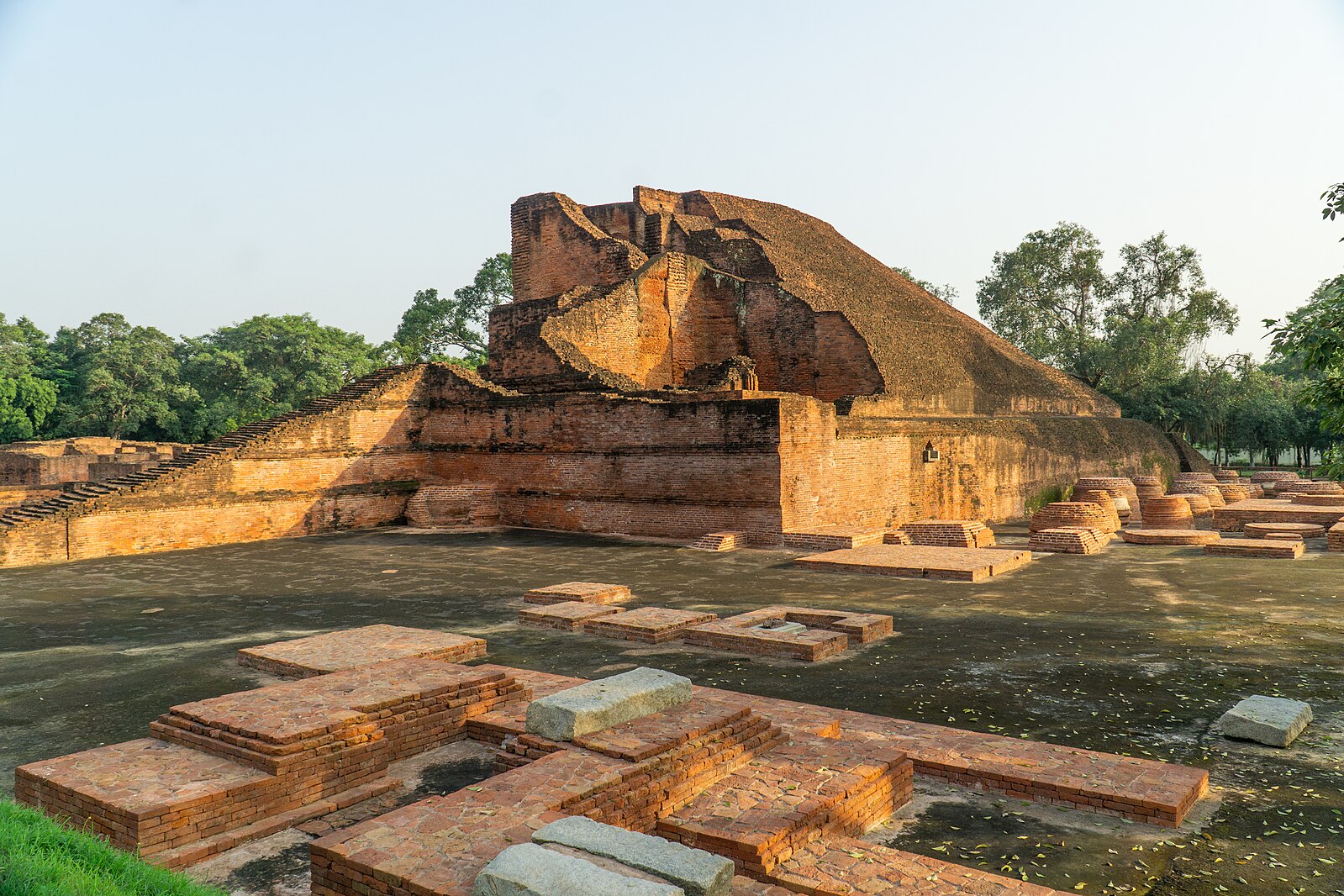In the Buddhist Asia of a dozen centuries ago, the equivalent of going off to study at an Ivy League school was going off to study at Nalanda. It was founded in the year 427 in what’s now the Indian state of Bihar, making it “the world’s first residential university,” as Sugato Mukherjee writes at BBC travel. As it developed, Nalanda became a “home to nine million books that attracted 10,000 students from across Eastern and Central Asia. They gathered here to learn medicine, logic, mathematics and – above all – Buddhist principles from some of the era’s most revered scholars.”
Alas, despite being much older than the famously venerable universities of Bologna, Oxford, or Cambridge, Nalanda can’t claim to have been in continuous operation since the fifth century. Destroyed by marauders during Turko-Afghan general Bakhtiyar Khilji’s conquest of northern and eastern India in the 1190s, its vast campus lay in obscure ruins until Scottish surveyor Francis Buchanan-Hamilton and British Army engineer Sir Alexander Cunningham rediscovered and identified it, respectively, in the nineteenth century.
In its nearly eight centuries of initial activity, writes Mukherjee, Nalanda attracted proto-international students from all over Asia, and “regularly sent some of its best scholars and professors to places like China, Korea, Japan, Indonesia and Sri Lanka to propagate Buddhist teachings and philosophy.” Its notable faculty members included Aryabhata, “the father of Indian mathematics,” who may have been its head in the sixth century, and Chinese Buddhist monk Xuanzang, who returned to his homeland in 645 with “a wagonload of 657 Buddhist scriptures from Nalanda.” Later “he would translate a portion of these volumes into Chinese to create his life’s treatise.”

Image by Sumitsurai, via Wikimedia Commons
Of the nine million handwritten Buddhist manuscripts in Nalanda’s library at the time of its destruction, “only a handful” survived. Some of them eventually made their way to the Los Angeles County Museum of Art, a fitting enough tribute to the world-spanning outlook of the institution. Not far from its original location, now a UNESCO World Heritage site, Nalanda is making a comeback as an international place of learning for the twenty-first century. You can get a sense of how that project is shaping up from the BBC Reel video above. “I think we are already a university of the future,” says its Vice Chancellor Sunaina Singh, and indeed, a promising vision of the future needs nothing quite so much as a sufficiently deep past.
Related content:
Introduction to Indian Philosophy: A Free Online Course
How 99% of Ancient Literature Was Lost
Based in Seoul, Colin Marshall writes and broadcasts on cities, language, and culture. His projects include the Substack newsletter Books on Cities, the book The Stateless City: a Walk through 21st-Century Los Angeles and the video series The City in Cinema. Follow him on Twitter at @colinmarshall or on Facebook.


Pls do remember the teaching monastery at Jaulian (Jaulian means ‘Seat of Saints’).
This is a major site of Gandhara civilization, and is situated about 35 km from Islamabad along the old Silk Road. It dates from the 2nd century CE and now a UNESCO World Heritage Site too. Buddhism spread to China from here … Fa Hiean and Yuan Chuang were the earliest converts to Buddhism and they travelled back to China.
Nalanda is no doubt well known, but it came a couple of centuries later.
We are unfortunately witnessing a re-writing of South Asian history.… every thing emanated from India !
I guess the oldest university was run by Brahmins at Taxila and visited by Alexander.
Yes. Everything did emanate from India. But now we have to call it “South Asia” because the masters at Harvard say so.
Hahahaha. No it didn’t.
Pkease research tge origin more. It was not just a Buddhist university. It existed before Buddha lived. This was a Hindu university which welcomed the inclusion of Buddhist works. The muslims came in and destroyed it. They lit the libraries on fire to destroy the knowledge hinduism is based on in hope of thus destroying the practice. Thanks to the strength of Hinduism it still survives.
That part of the World was dominated by Hinduism; the Buddhist we’re not the ones who instituted the Library, neither did they manage it over that 800 years; Buddhism existed in that region as minority who latter be forced out of India all together. I’m confused about the opening to the Article.
Lot of typos, but it is accurate. Even at it’s high in India, it was only one religious order, amongst others.
The above article is incorrect and ranks full of biasness, Timbuktu is the place with the oldest University and houses the most and old manuscripts it would do you good to carry truthful and honest research without biasness remember the Holiest River in India is named after an Ethiopian King and India itself was part of the Ancient Ethiopian Empire, Peace and Love.
Muslims never burn libraries or crops. Mongols and Hindus love to burn everything, even widows.